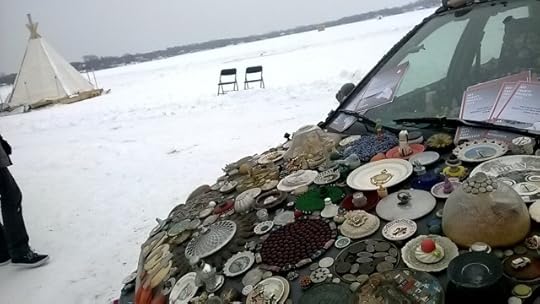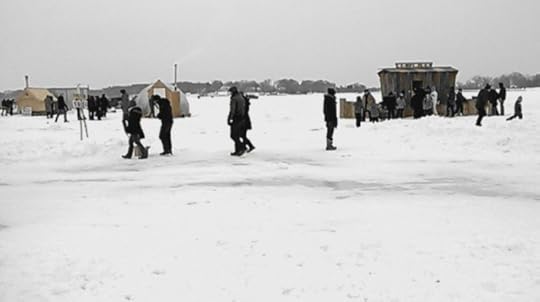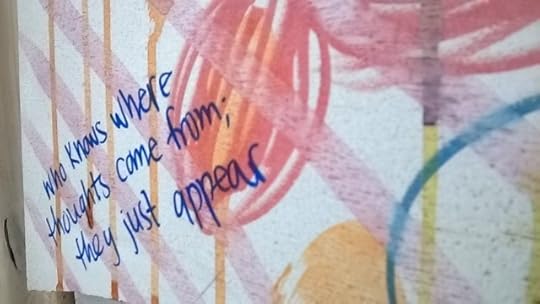Kelly Barnhill's Blog, page 7
February 13, 2014
On Avoidance, Resistance, and Muddling Through

I have violated my New Year’s Resolution. I erased a third of the novel. Irrevocably. I erased it on my computer, from the emailed copy I sent to myself, from Dropbox, from my husband’s email. Everywhere. Or so I thought.
I had a really good reason for doing this – largely, the general sucky, lousy prose – but I am regretting it now. I mean, I was. More on that in a minute.
There is a thing that can happen in the quiet of the office space. By the clicking of the keys or the scritching of the pen on the paper. That little, itchy, insinuating voice that creeps along the neck and down the spine. It’s bad breath tickles the ear. It has sticky fingers and a grubby face and hair like thistledown.
Really? the voice says.
That’s what you wrote?
No one could possibly like this.
Now, let’s be honest. The voice wasn’t wrong. The pages – eighty of them in all – were pretty crappy. However, the promises that the voice insisted were true – that my agent will never want to speak to me again, and that my editor will cancel my current book because good god what was I thinking, and that booksellers and librarians will, en masse, remove my book from the shelves and throw them in the garbage, and that my husband and children will disown me and that I will never write again, and really, why would I – well. Those are probably not true.
So I selected the last third of the book. And I erased it. And I stared at the screen. For a long time.
And then I did what many of us do when we are facing something difficult. I avoided.
I am an expert avoider. I could get an Olympic medal in Avoidance. Wait. Do they have those? I hope so, because that would be awesome.
Now, in my past, this period of avoidance has been prolonged and deep. Less so now. Now, at least I have learned to recognize avoidant behaviors and resistant behaviors. Now I have learned the importance of muddling through.
For me, muddling through means sometimes working on other things. Yesterday, for example, I was writing a scene that was emotionally exhausting and painful. To keep me moving, and keep me sane, I turned on a timer and opened another document. Twenty minutes working on the scene, twenty minutes writing a goofy, sexy, satirical story about Helen of Troy growing up – ugly and lonely – in that tower with her randy mom and her slutty dad. And it was super fun. I probably will never publish it, but that’s okay, because it got me through that scene – and that chapter.
Another thing that helps me muddle through is to be – shall we say - non monogamous - in my work habits. The book I’m working on was originally longhand, but the version on my computer is so utterly divorced from the original draft, that I can’t even use it anymore. Which means I am stuck on the computer – not a happy place for me. So I have another novel – that I might be finishing today, actually. And that’s totally longhand. And it’s completely different from the more serious novel that I’m currently married to. It’s funny and irreverent and biting. It’s a total departure from everything I’ve ever done. And – like most affairs, I’m told – it gives me the shivers just to touch it. Just to hold it close. But working on both projects allows me to keep both stories fresh, whole, and energized. It allows me to be fully present in both, because neither have gotten stale.
Also: I have a stack of notecards in my desk drawer upon which I write scene outlines, lovely sentences, story ideas, or whole paragraphs. I save these for later.
Also: I wrote a novella – something Not For Children. It poured out of me at Christmas time, and waits, quietly, while I decide what to do with it.
Also: I am revising two Broken Novels to see if I can un-break them. Maybe I can. Maybe I can’t. But the work itself is satisfying. It is filled with notes in margins in red pen and handwritten pages on looseleaf stuck into the binder. Binders full of words. It is a beautiful thing.
There is a theme here. Did you notice it?
Resistance happens to all of us. Avoidance happens to all of us. The only cure for writer’s block is writing. The only cure for bad writing is more writing. The only cure for those nasty voices that show up, unbidden, in our brains, is to write our way to the other side. Whatever project. Whatever it takes.
I discovered that the pages I erased weren’t entirely erased at all. Google Drive. I had forgotten I had done it. I was there last weekend looking for something else, and my novel winked back at me – beginning, middle, and end. I didn’t erase it. I decided to leave it there, untouched, and will continue on my way until I reach the end on this side. Then I will compare the two. It’s only fair.
Today, I have another tough scene to tackle. And I will tackle it. Today, I have a composition notebook that will have new pages with jokes and witches and perhaps a kid with a checkered past saving the day. Or maybe the witch will save him. I haven’t decided yet. Today, I will put more words in the short story about memory and I will fuss a bit more on the Lake Erie novel with shape-shifting dog-men.
Today, I will write words. I will not resist. And I will muddle through.
But first, I will turn on Freedom. Because, good god. The internets, man. So shiny. So devious. In the meantime, I am curious about you folks. How do you muddle through? How do you break down your resistance and get work on the page? How do you quell those ugly voices and tell them to shut up and be done with it? I am terribly curious.
Filed under: Uncategorized Tagged: internet freedom, novels, The Writing Life, the writing process, writers block


February 12, 2014
“Everyone Else Can Suck It” – thoughts on art, work and making things.

LOOK WHAT I MADE!
One of the things I treasure about living here in the Twin Cities is its astonishingly vibrant, well-populated and deeply talented children’s literature community. I have friends who write YA novels and MG novels and picture books. I have friends who are illustrators and graphic novelists and copy editors. And not to mention the editors, publishers, agents and professors of children’s literature. And don’t even get me started on the librarians and curators. It’s ridiculous. And I adore them all.
And what’s more, it’s an incredibly loving, supportive and dynamic community, all deeply committed to children’s literacy, children’s access to books, as well as infusing the art form with the kind of vigor and wonder and love that it demands. I’m lucky to be a part of it.
The other day, I was at a local coffee shop, working at the big table with a bunch of other authors. We had laptops and notebooks and sketch pads interspersed with coffees and scones and salads. We kept one another on track when needed and offered commiseration when needed and told jokes and even, as a group, did some quick research on the names and types of ladies’ underwear. Yanno. Story stuff.
At one point I showed the folks present some of the preliminary sketches for the cover of my new book, The Witch’s Boy (I wish I could show you. But alas. It’s not ready yet), and I enjoyed the collected ooos and ahs, and I shared some of my feelings of anticipation and apprehension and worry. The other writers and artists assembled nodded their heads sagely. We know, their faces said. We super know.
“But,” I said, “fortunately, I have already pre-written my horrible reviews. So that’s taken care of and I don’t have to worry about it.”
Cue the collective sigh.
“Really, Kelly?” they said. “Why do you do this to yourself?”
And it’s a reasonable question. And I do this to myself a lot. The book I wrote. The book I wrote a while ago. The book I’m writing now. It is so easy to see how someone along the way will dismiss it out of hand. Who will turn a small gripe into a condemnation of the book. Who will not see my characters as I see them, and love them as I love them.
And it is silencing, this pre-bad-reviewing. And it is hurtful. And it is mean.
“Well,” my friend Swati said. “What do you think about your book? How do you feel about it?”
And I looked at her, and I allowed myself a rare moment of honesty.
“I love it,” I said. And I meant it too. “I really love it. And I’m proud of it. And I feel like it’s the best thing I’ve ever written in my life.”
She smiled at me. “Well. There you go. You wrote a book that you love and that you’re proud of, and that’s all that matters. And everyone else can suck it.”
And I told her that I was going to make a sign saying that very thing and put it above my desk, which I have done, and am looking at right now, with total love and adoration on my face.
I turned in my copy edits to The Witch’s Boy last week – it was my very last time being able to touch the paper, to make marks or switch things around or affect anything at all. And I took the time to savor it. I closed myself in my office for days, reading the pages out loud. It was, in truth, like the fiftieth time I have done so – I am an out-loud sort of self-editor. And I read each word with gusto, heft and meaning. I felt each sound vibrating in my bones. And I felt as though Ned and Aine and Sister Witch and the motherless wolf and the bandit king and the dead brother and the aging queen and the grieving father and even the insufferable Brin and Ott and Madame Thuane - all of them, you see, were right there with me. Their hands on my hands. Their breath in my ear. Their hearts rattling away inside my rib cage. And I loved them. And I was proud of them. And I slipped them all into a document box and sent them away.
When we make art – and really, when we do any kind of work that we feel born to do – there is this wonderful sense of non-self that comes over us. Hours can vanish, our real life can vanish, even our bodies and histories and futures can vanish. While we work, there is only the work. It’s wonderful, really. Our work is not us, it is separate from us. And that is important, because we send it into the world, where it can be loved or hated, adored or abused, learned from, built upon, and, ultimately, transformed. The work changes us, it changes the people who touch it, and it changes in return.
There is something wonderful that happens when we make work that we like. We can hold it in our hands; we can turn it around and around; we can run our fingers through the sheets of paper, and listen to it make the sound of ocean waves whispering on an endless shore; we can linger on the scent of ink and paper and fingerprints. But what’s more – we can say to the world, Look. I made this. And you can love it or you can hate it or you can not care either way, but it doesn’t matter. I made this. And it is for you.
I was at South High School the other day, and I said some stuff about making art and being vigorous and demanding and infusing their stories with the fullness of their intelligence and curiosity and perfectionism. But what I should have said was this:
Make art.
Work hard.
There will be people who don’t care for what you do. That’s okay. And that’s their right. Work hard anyway.
Pour your heart and soul and self into whatever you do until you think there is no more you left. (You will be wrong. There is an endless fountain of you-ness. And there is no limit to what you can make.)
Make work that you are proud of. Work that will outlast you. Work that is your gift to the world. Make work that is separate from you.
And everyone else can suck it.
Filed under: Uncategorized Tagged: Childrens literature, fiction, Middle Grade Novels, Minnesota, mnkidlit, The Writing Life


February 9, 2014
“Seriously, how can you stand it?” – a meditation on my beloved Minnesota
As I write this, it is -5°F. I think the high today is two. The snow squeaks underfoot with each heartbreaking step. The wind insinuates itself through our coats, into our balaclavas. It whispers through the walls. The snowpiles on the sides of the road have not melted since November. They are now as dense and cruel as concrete. The streets are narrow and slick. Salt has grayed the edges of the world, uglying what once was beautiful.
This winter has been long, man. A long, bitter slog. And even the most dedicated of winter enthusiasts has found themselves looking at real estate listings in exotic-sounding places like Arkansas or Louisiana or Texas. Swampy places. Deserty places. Places where they close the schools if someone heard one time that it might be approaching freezing. Right now, that sounds wonderful.
I’m just kidding, of course. I am never leaving my state. I love its farms and its rivers and its lakes. I love its ancient granite cliffs in the north and its insanely fertile soil in the south. I love its forests and its massive bogs and its high prairie to the west. I love the rush of spring, the loll of summer, the symphony of color in the fall. And I love the winter. I really do. Even now.
I get a lot of people looking at our weather reports – did you know that some people read the weather reports of places where they do not live. They look at the crazy low temps in Embarrass, Minnesota, and they fan their faces – thrilled, swept away, utterly spent. It is weather porn. No one can convince me otherwise.
Wait, what was I saying? Oh, right. People write to me and say, essentially, HOW CAN YOU STAND LIVING THERE? Their words are kind, alarmed, and urgent. They talk to me the way one talks to a spouse in an abusive relationship. Or a long-term kidnapping victim. IT DOESN’T HAVE TO BE THIS WAY, they plead with me.
The thing is? Even when it’s cold, it’s still pretty awesome. And there’s something that happens to us in the cold – an intense camaraderie, a joined sense of purpose, a collective pact of survival and victory. We are Sam and Frodo in Mordor. We are the Light Brigade, facing certain doom, and going down fighting. We are the 10th Mountain Division, fighting and dodging Nazis on Nordic skis. Nothing makes you love your neighbor more than to help them build a glowing, multicolored ice castle in the front yard.
Nothing makes you love the half-crazed kids in the neighborhood – especially after they descended on your home to play Minecraft and subsequently tore it to shreds, than to see them doing this outside:

One thing my state does incredibly well in the winter making a lot of social things for us to do in the winter. Because, no matter how cold it is – and yes, it gets frakkin cold – we can still get outside. And we should. Getting outside changes our relationship with the cold. It changes our relationship with the seasons. And it makes it love it – and one another. I have been accused before that perhaps the over-cold temperatures make us high. This is possible. After, all, we do organize kite-flying festivals every year. On a frozen lake. It is marvelous.

And cross country skiing festivals:
At some point, we simply learn that it’s not the weather – it’s the gear. And it’s the relationship, too. When we dress warm enough, we go beyond simple survival. We become part of the outdoors. We explore; we connect; we wonder. We have this incredible opportunity to fully experience the astonishing beauty of winter – ice crystals and wind, deer tracks in the snow, deep drifts, frosted tree trunks, the utter silence of a frozen forest, the swish of a ski on a well-honed track, the cut of branches holding up the sky. The landscape is beautiful. The people are beautiful too.
Yesterday, we went to the art shanties – twenty-two ice houses-turned-artist installations. There was a shanty turning wind into art, there was a shanty that had transformed itself into a giant music box, there was a shanty where you could write and read people’s letters. A shanty full of polar bear art. A shanty made of salt. A shanty with a Totally Legitimate Elevator. And the people drove out to the ex-urbs. And they parked their cars and they walked out onto the frozen lake. And they participated in the art – they made, they wrote, they danced. They climbed inside a giant, multiple-bike-powered polar bear puppet, and drove it around. And they smiled in spite of the cold, through the cold, because of the cold. And it was good.
Seriously, how can I stand living here?
Seriously, how can I live anywhere else?
Filed under: Uncategorized Tagged: art, Minnesota, winter 

January 13, 2014
In Which Voldemort Gets the Cheese Touch.
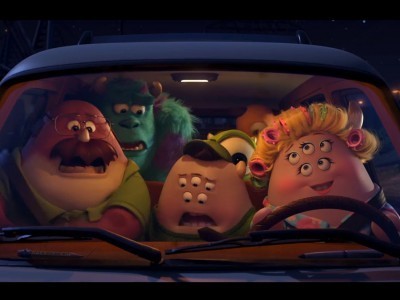
This is the expression on my face most days. Especially the eyes.
I think I’ve mentioned on this blog the fact that I, most days, haul a carpool to school filled with delightful elementary school boys. I use the word “delightful” here in its broadest sense, in order to include yelling, cat-calling, fake-swearing, bodily eruptions, poop jokes, gun jokes, penis jokes, fart jokes, farting penis jokes, something about boobies and light-saber-sound-effects. To rescue my thin grip on sanity, I decided a while ago to forgo any crunchy-mama prohibitions I may have had ever in my life regarding screen time and throw a movie into the ole minivan VCR.
(It is, I do believe, a certifiable miracle that the thing still works, as both minivan and VCR are about ten years old. And that thing gets hammered – hot in the summer, absolute zero in the winter, sticky drinks, stray kicks, and, once, projectile vomit. The thing keeps ticking. If it is a miracle, does that qualify my minivan for sainthood? If so, someone should alert the Vatican.)
Anyway, the kids watch movies on their way to school in ten minute increments, and I listen to said movies as I drive. E.T, Apollo 13, Star Wars, Newsies, Cats and Dogs, Galaxy Quest, Diary of a Wimpy Kid, The Dark Crystal, George of the Jungle, and basically whatever else I’m able to pick up at Savers for a quarter. I have become a connosieur of kid-movie sound construction and voice inflection. E.T., for example, is a thing of beauty – communicating more through silence than most films can do in hours of scene-building. The Phantom Menace, on the other hand, while bad to watch, is torture to listen to, and whoever is responsible should be in prison.
Today, they watched Harry Potter and the Sorcerer’s Stone, or the end of it, anyway. They tumbled out of the car last Friday just as Professor Quirrell was about to remove the turban from his head. They climbed back into the car today shouting turn it on turn it on, despite the fact that they have all read the book and watched the movie approximately nine million times. They were beside themselves with anticipation. I pushed play, rolled into the road, and headed toward school. Here is a transcription of the conversation that ensued in the back seat.
“Shhhh!”
“You shhh!”
“We’re missing it.”
“You’re missing it.”
“Cheese touch.”
“Wait. What movie is this again?”
“Harry looks like he has to fart.”
“HE DOES NOT.”
“Cheese touch.”
“You’re squishing me.”
“You’re squishing me.”
“Cheese touch.”
“Why do you keep saying that?”
“Look.”
At that very moment, Voldemort, stuck on the back of the doomed professor’s head, instructs Quirrell to take the Sorcerer’s stone from Harry. But when he touches Harry, his hand burns up, thus showing that Voldmort cannot be touched by the boy wizard.
“Harry Potter has the cheese touch.”
The boys nearly peed themselves laughing.
“Now Voldemort has the cheese touch. Lookit him! Cheese toucher.”
“DON’T TOUCH VOLDEMORT HE TOUCHED THE CHEESE.”
“Voldemort smells like a fart. Like cheesy farts.”
“Cheese farts are not as bad as sausage farts. Sausage farts are THE WORST.”
“I’m kinda hungry.”
“Don’t let Voldemort get the Sausager’s Stone.”
“It’s the Sorcerer’s Stone.”
“No. It’s the Sausager’s Stone. IT HAS THE POWER TO TURN MERE METAL INTO SAUSAGE.”
“Quit saying stuff like that. I have to pee.”
“Harry Pee-ter and the Sausager’s Stone.”
“I MEAN IT.”
“If it could make me defeat Voldemort I would totally touch the cheese.”
“You already touched the cheese.”
“I AM VOLDMORT. I AM THE CHEESE. AND THE TOUCH. I AM THE CHEESE TOUCH.”
By the time we reached school, I was weak with laughing. And hunger too, as I had forgotten to have breakfast before I left in the morning. When I got back to the house, I went straight to the fridge to grab something quick before getting to work. A nice, square slice of cheese.
Cheese touch.
Filed under: Uncategorized Tagged: carpool, Childrens literature, Diary of a Wimpy Kid, Harry Potter, I Am The Cheese, raising boys


January 9, 2014
Why I Love Fourth Graders: A List.
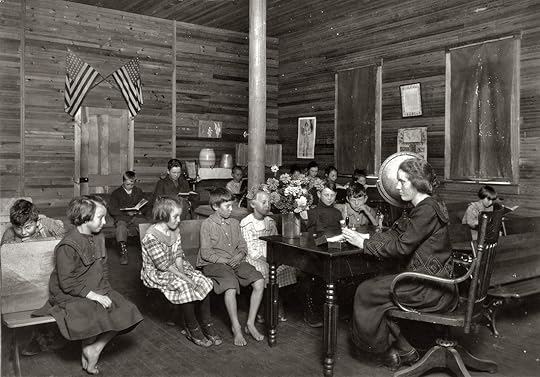
Author’s note: I think more children would love school if they were allowed to be barefoot.
Today I visited the fourth graders of Highland Park Elementary School in Saint Paul. I was feeling crummy beforehand – sniffles, headache, tummy-yuck, etc. – and was probably not in the best headspace to perform at optimum awesomeness. That didn’t matter. The fourth graders had Awesome to spare. They had Awesome pouring out of their eyes, ears, mouths and noses. They left little trails of Awesome on the ground like awesome slugs. They emitted little pollen particles of Awesome like awesome daisies. They rang like bells and surged like oceans and glittered like stars. I think I have mentioned here before on my blog how very very very much love I have in my heart for fourth graders. And while I always know that, intrinsically within myself, it is still completely surprising to me whenever I step into a fourth grade classroom. All the love I thought I had for fourth graders, the moment they congregate in their desks, is amplified ONE SKILLION FOLD.
They are wondrous, these children. Completely wondrous.
To give you a sense of why I love these kids so much, and why they delight me so, and why they – more than any other age group – propel me again and again to the page, I composed this list.
WHY I LOVE FOURTH GRADERS. By Kelly Barnhill
1. Because they ask me if I’ve ever met L. Frank Baum. It doesn’t even occur to them that he has been dead for a long, long time. For them, writers are as alive as their books. And books never die.
2. Because they assume that I’m best friends with J. K. Rowling.
3. Because they want to tell me, RIGHT NOW, that this sweatshirt is new.
4. Because they see me in the hall and say I KNOW YOU, YOU’RE THE WRITER. And they are shiny and happy and proud. They have this funny quality of being both star-struck and familiar. They are reading your book. They are astonished you are real. You are both an object in a museum AND a beloved teddy-bear, clutched under the covers every night. At the same time. They have no problem with that incongruity. For them, the world is an incongruous place.
5. Because they are on the fence as to whether magic exists. Could go either way. They are open to wonder.
6. Because the sit with their hand outstretched to the heavens, bouncing and wiggling and saying “Oh, oh, oh!” and can do so for an entire class period if need be. And when you call on them, they say, “Okay. I have thirty-two questions.”
7. Because they crowd together on their carpet square, jostling for spots near some grownup that they have never met, a close-knit, multi-colored, multi-ethnic, multi-lingual mob, all unified by one story, read to them by a beloved teacher.
8. Because they want to know where stories come from.
9. Because they believe that stories come from somewhere - a sea of stories somewhere on this green and blue earth, where writers go with their boats and their tackle and their nets. Where we cast and gather and pull and haul. Where we heap stories into our carts and wheel them into the marketplace to be shared for all.

Stories are slippery fish.
10. Because they want my autograph on a random scrap of paper that they will lose within the hour, but that doesn’t matter. It was the asking that mattered. And me bending over, pencil to paper, letting them know that, in this moment, they matter to me.
11. Because they want to matter.
12. Because, deep inside, they are both infant and adult. They want to be cuddled and adored. They want to save the world. They want to be shielded. They want to understand. They want to be connected. They want to be alone. They want to be heroes. They want to be saved. They want all these things at once.
13. Because they love stories. And so do I.

Filed under: Uncategorized Tagged: Author Visits, Childrens literature, fourth graders, Magic


January 8, 2014
If you haven’t watched Chimamanda Ngozi Adichie’s talk on feminism, you should watch it now.
Seriously. I love this woman. I love her books, I love her articles, I love her presence in the world. I want her to narrate my brain. I love her clarity, her analysis, her compassion, her fire, her precision, her poise. If you have thirty minutes, give this a listen. I did so yesterday, while doing Very Womanly Tasks, like cleaning my oven and making soup and running after children and folding laundry. You know what makes folding laundry WAY more interesting? Listening to TED talks. On feminism, for example.
Specifically, as a mother of both girls and a boy, and a loving grown-up in relationship with lots and lots of boys, I particularly resonated with this: “Gender as it exists today is a grave injustice….I would like today to ask that we begin to dream about and plan for a different world, a fairer world. A world of happier men and happier women who are truer to themselves. And this is how to start: we must raise our daughters differently. We must also raise our sons differently. We do a great disservice to boys in how we raise them. We stifle the humanity of boys. We define masculinity in a very narrow way – masculinity becomes this hard, small cage, and we put boys inside that cage. We teach boys to be afraid of fear, weakness and vulnerability. We teach boys to mask themselves. . . We teach girls to shrink themselves, to make themselves smaller.”
Seriously, it’s great. And worth the time out of your day.
It is still very cold in Minnesota, and I had the kids home for two days after the Governor closed down the schools due to extreme windchills. We are stir crazy. Cabin feverish. If you are living in a warm place, please tell me a warm story so that my bones may thaw and my eyeballs may un-crystallize and my soul may creep out of the freezer and bloom again.
Filed under: Uncategorized Tagged: Authors, feminism, Nigeria


January 6, 2014
Can gnomes steal a person’s handwriting? I think maybe they can.
So, I’m cleaning my office (I know, right? Shocking), and I come across a notecard with the beginning of a story. One that I have no recollection whatsoever of actually writing. Like, at all. It’s my handwriting, for sure. My handwriting, by the way, is terrible. It’s beyond terrible. It looks like it is the ripped from the final gasp of last Will and Testament of a dying raven, written in its last minutes, in dust and tears and its own red blood. I’m stunned that anyone can read it. Hell, I’m stunned that I can read it.
Wait. What was I saying? Oh, right. The story.
There’s not much to it, just the beginning of a story that I can’t remember writing at all. I can’t even remember coming up with the idea. When did I do this? And why is it on a giant note card? Where was I when I wrote it? A bus? A coffeeshop? The dentist’s office? On hold with the health insurance company? No idea.
Anyway, here it is, transcribed, for your reading pleasure. Don’t know if I’ll ever do something with it, but it’s always a possibility.
Arthur stood on the chest of the now-cold body of the giant and pulled his father’s sword from the monster’s heart.
“One down,” he thought. “Nine to go.”
“Is it dead?” a voice came from a small pile of stones nearby.
“It is,” Arthur said, wiping the green blood of the giant off the gleam of his sword. “No thanks to you.” He checked the bright edges for nicks before returning it to the safety of its sheath.
“Are you sure?”
“That it’s dead, or that you didn’t help?” His shoulder ached, the wound on his left hip oozed and legs were giving out. He needed a doctor. And a bed. And a year of sleep.
“Killing giants wasn’t in our agreement,” the pile of stones said. “I was very clear what I wanted you to do. Don’t expect a bonus payment. In fact, maybe we should put this down as a deduction for pain and suffering.”
The pile was silent for a minute. “My pain and suffering,” it added, just to be clear.
Arthur rolled his eyes. He slid carefully down the curve of the giant’s ribcage and landed squarely on his feet, wincing as he did so. The pile of stones shivered and shuddered and quaked. It clattered to one side and then the other, assembling and disassembling, reorganizing itself over and over until a boy about Arthur’s age climbed out of its center, patting the dust and dirt and debris out of his smart tweed suit and beating his cap clean.
The stones were gone. There was only the boy.
“I hate transforming,” the smart-dressed boy said. “So dusty.”
Maybe I wrote this while camping. Or after a long day of cleaning my dusty, dusty house. Or maybe I didn’t write it at all, and my office is infested with story-writing, pen-stealing, idea-surfing gnomes. Maybe the gnomes have been creeping in the walls, burrowing in the ceiling and harvesting our dreams. Maybe gnomes eat stories. Which, honestly, would make sense, now that I think about it.
Has this ever happened to any of you people? Have you ever found work that you must have done but you have no memory of ever writing it? Maybe this does happen to everyone.
Or maybe I’m just nuts.
Filed under: Uncategorized Tagged: fiction, gnomes, story-writing


January 5, 2014
On resolutions, intentions, and the lack thereof.
I don’t like New Year’s resolutions. Actually, that’s not entirely true. I recently don’t like New Year’s resolutions. This is partially due to the fact that I typically don’t actually keep resolutions, which in turn is due to the fact that my resolutions are often wildly optimistic. (I have not, for example, won a Nobel Prize, nor have I summited any mountains, nor have I learned any new instruments, nor have I become Suddenly Good at Math.)
I prefer the term intentions. Resolutions are grim, static, imposing. They are good at guilt trips. They glower. They wag fingers. They reek of disappointments. Intentions, however, are different. They are the whisper in the ear, the nudge at the side. Intentions are rooted in a place of kindness. They are forgiving. They are prayerful.
Making a list of intentions for the coming year requires a person to reflect on the year prior – what worked, what didn’t. What fed the soul. What depleted the heart. With these intentions, I would like to find ways to offer myself to the world. To make the people around me happy. To make strangers happy. To make me happy too. But to really get at what I intend for the year to come, it’s important to also identify what I do not intend to do. My Non-Intentions. For example:
I do not intend to run a marathon. Yes, I just turned forty, and yes, it does seem like it’s the sort of thing that people do when they reach a milestone birthday, in a “Hey, look at me, I am still young and strong and can OUTRUN DEATH if I feel like it” sort of way. Here’s the thing: I’m a runner. I love running. I do my best writing while I’m running. I like running around lakes and along rivers and down wooded trails and endlessly on lonely, prairie roads that connect my feet to the edge of the sky. But a marathon? Nawp. I don’t even like to drive twenty-six miles. An eight mile run does me just fine.
I do not intend to keep my house perfectly clean at all times. There was a time, a few years ago, when we had a bit more extra cash sitting around to allow me to have a little help with the housework. That time, alas, has passed, and our spare pennies are going to boring things like college savings accounts and orthodontics. I put a lot of pressure on myself to keep the house dust-free and dog-hair-free and clutter-free. I do not intend to do so this year. We will not live in squalor – I couldn’t abide it if we did – but I do not intend to give myself guilt trips about it. So there.
I do not intend to abide by strict word counts. There have been times when I have done this. Two thousand words a day or four thousand words a day or ten thousand words a day, or you are a TERRIBLE PERSON. This is crazy-making. And not helpful, because as one who is a serial/obsessive eraser, it meant that I was killing myself just to go backward. I write two thousand words, I erase another two and a half thousand. I write four thousand words, I erase five. I have been known to erase sixty thousand words in one sitting. And yes, there is a rip-the-bandaid-off-in-one-go sort of feeling to it, I can’t recommend it as a long-term strategy. This year, I have felt like I was turning my wheels. And I’m ready for a new strategy.
I do not intend to finish every book I start. This is a big one. Maybe it’s the teacher-pleaser that never really left my psyche, and maybe it’s the Puritans whose ghosts walk the varied byways of this country and remind us that if it’s unpleasant IT MUST BE GOOD FOR US, or maybe it’s the fact that, as a writer myself, I know how very hard it is to haul a book from idea to word to page to publication. Still. I find that by forcing myself to slog through books I hate in a Sir-Edmund-Hillary-BECAUSE-IT’S-THERE mentality, it damages my relationship with reading and my relationship with books. From now on, Books? I give you a hundred pages. And then I walk.
So. Those are my non-intentions. Here, instead, are my Intentions for this year.
I intend to rethink my relationship with social media. I’ve done this before, of course. And it was useful. Social media is, unfortunately, a necessary utility for writers. I say “unfortunately” not because there is anything inherently wrong with it. There isn’t. And, in fact, I take a great deal of pleasure from my deeply felt interactions with people online. I love the conversations, I love the connections, I love the humor, I love the abundance of knowledge and learning, I love the cocktail-hour feel to it. I love it a lot. And there is an incredible amount of joy in the crafting of a well-turned sentence, or a bi-tonal tweet, or a Facebook update that hits those notes of humor and rage, for example, or pathos and silliness, or analysis and rumination. But that’s just the problem. Because writers need to be doing all those things in the quiet of their desks, separate from the world, and utterly alone. Which, of course, is lonely. So it makes sense that writers would, perhaps, be more prone to addictive and obsessive behaviors online. Because it makes us feel wonderful. And the manuscript that we labor over in secret can never give us the kind of instant feedback and thumbs-up validation that we get from a tweet that gets re-tweeted a hundred times in a day. It’s like the Meth version of writing – awesome for a while, but it can up-end one’s life. I spend far too much time on social media, and it eats away at my writing time. So I’m going on a two month break, and will likely keep doing so. I want to experience the fullness of the conversation without the conversation driving the rest of my work. Family comes first, work comes second, and the conversation needs to be way down on the list. It’s just the way it is. So, I closed down my Facebook account, and blocked Twitter from my computer. I’ll still tweet occasionally, but only from my phone, or the automatic posts that WordPress makes every time I post something. In any case, it can no longer interfere with the tools of my trade, as it were. Because I need those tools.
Short Fiction. I made a resolution last year to write one short story per month. This, alas, was wildly optimistic. I only wrote three. Four if you count the unpublishable novella, now standing at 30k. Uff. What was I thinking? Still, short fiction feels really good, and it allows me to explore territory that I likely won’t explore in my longer-form fiction. It is a much darker place. Edgier. With sharp teeth. I enjoy the work, and would like to plan for a reasonable increase in volume. So. Five. I intend to write five short stories this year. We’ll see if I can do it.
I intend to stop erasing this year. I had a bit of a Coming-To-Jesus moment this year, when I realized that I erased more words than I had in any form in my manuscripts. Like, by many, many, many times. I write; I erase; I re-write; I re-erase; over and over and over. And it’s not useful. And it’s indicative of something else, too – a fear of finishing, a lack of honor in my work, a gap in kindness toward myself. So, step one. No more erasing. If I don’t like something, I make a new document. This is the new rule.
I intend to do yoga every day, even if it’s only ten minutes. This has been awesome so far, actually. Because it really has only been ten minutes every day, and even that has huge benefits for me. I have a tendency to live within the confines of my brain (I know I’m not alone in this) and it’s not always the best place for me to be. Not only that, it is not an honest way of assessing how we typically live, you know? Our bodies are the interface through which we experience everything that is wonderful about being alive. One of the things I love about yoga is its insistence that mindfulness is not just the brain. Our skin is mindful. Our spine is mindful. Our intestines and lungs and shoulders and ankles and toes are mindful too. When I can fill my entire body with good, pleasurable feelings, when I can quiet my mind and slow my heart, when I can turn my focus away from the whirling dervish of my brain and focus instead on the flow of air in and out and in and out, it makes my work on the page far more fluid and easy and real. It’s remarkable, actually.
I intend to cuddle my kids and my husband and my dog every single day and tell them how much I love them. Actually, I already do this. Every single day. But it is nice to say it out loud. And write it on my blog for posterity.
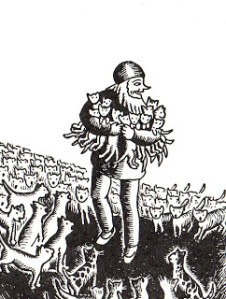
This is a typical moment in BarnhillLand. But with kids instead of cats.
How about you? What are your intentions? And what are your hopes for 2014?
Filed under: Uncategorized Tagged: New Year, Resolutions, Social Media, writing


December 19, 2013
What I want for Christmas is the dumbest ever.
Here is a conversation I had with my husband, recently. And you know what? I feel for the guy. I really do. He works so hard. And it can’t be easy. I’m not….well, I’m not the easiest person to be married to. I fully accept this. And I get it that he wants to give me thing, and holy smokes do I appreciate it. But honestly? I feel like I’m past the point in my life when holiday gifts make much sense. I have too much stuff. And the things that would actually make my life easier? Well, they’re a little out of reach, at present. Because all of our available funds are tied up in the kids and the house. But mostly the kids. So I told him that I really didn’t want anything in lieu of holiday gifts.
He did not accept this. At all.
HIM: We have to figure out what you’re getting.
ME: I don’t want anything. Seriously.
HIM: Seriously, nothing. What do you want for Christmas? Like wanting things.
ME: I’m not even going to tell you because it’s too expensive.
HIM: I don’t care. I just want to know what it is.
ME: Just get me socks or a subscription to One Story or something.
HIM: OH MY GOD YOU ARE THE WORST.
ME: It’s dumb. What I want is the dumbest ever. But I still want it. But I want not to want it so I’m not telling you.
HIM: COME ON!
ME: FINE. What I really want, more than anything else, is a Roomba.
HIM: No way.
ME: It’s true.
HIM: ….
…..
…..
ME: I know.
HIM: You mean the thing that scoots around and pretends to clean.
ME: It doesn’t pretend. It cleans. Not very well, I’ll grant you, but probably better than I’m doing right now. So. Yeah. That’s what I want.
HIM: You’re kidding, right?
ME: Alas, no.
HIM: You’ve got all of Western Civilization before you, with its centuries of perfecting the machine of the marketplace. We’ve got the art of making and marketing and buying and selling to a science so exquisite it deserves its own University system …. and on this, the season in which we slaughter yearling calves on our altars erected in temples dedicated to the gods of consumerism ….. and you want a vacuum cleaner?
(Author’s note: I might be elaborating here. I can’t quite remember)
ME: Yes.
HIM: And you don’t mind that it’s, like, housewifey and stuff.
ME: I don’t care. I want it. I want something to clean instead of me cleaning. I want ONE THING IN THIS HOUSE that does whatever I ask it to, because god knows the kids are hopeless with their books and their independent thinkings. I want something to devour the dog hair and attack the piles of sand that inexplicably appear on the living room floor. I want something to suck the dust away while I’m writing. I also want self-cleaning laundry and a macrobiotic chef and electric slippers. But mostly I want a robot. A best friend robot. A cheerful, always wants to help robot. A hard-working robot servant/family member/mostly a servant to clean my floors and look silly carrying unlikely objects across the floor like martinis and doughnuts and do what I ask and I shall name him Algernon. But I shall call him Ernest.
HIM: That’s a compelling argument.
ME: I know, right?
HIM: Hmmm. Well. How much are they?
ME: Like four hundred bucks.
HIM: Ah.
ME: Yeah.
HIM: So. Socks, then?
Which is fine. I made sure to send him a picture of these:
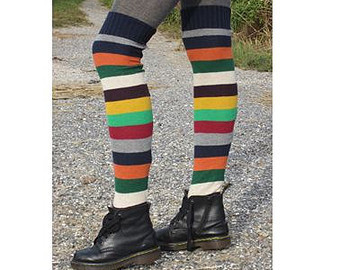
Filed under: Uncategorized Tagged: Christmas, Holidays, marriage, Roomba, Shopping


December 14, 2013
Saturday Sharing Time – lets see some bits from your WIPs (c’mon. you know you wanna.)
It’s been quite a bit since I’ve asked you people to share bits and pieces from your hidden pages, and I think it’s high time to do it again. Because it’s fun! I’ll start:
(and this piece – called “The Unlicensed Magician”, will likely never see the light of day. It is a novella – and where the heck do you publish a 30k novella? Nowhere, alas. Ah well. Maybe I’ll self-pub it someday. After I fuss at it. Endlessly. For years.)
The Minister had never counted on the wind. He built his tower higher and higher – a wobbly, twisty, unlikely-looking structure, uncurling like seaweed toward the shimmering limit of the sky. Dark stones, blackened windows. Impossible without magic. And now it was higher than any structure in the history of the world. The Minister knew the history of the world. He had all the history books. The ones he hadn’t burned, anyway. And while the books told of impressive structures, they never mentioned the winds.
The wind, at the top of the tower, once nearly sent him careening to his death, which would have been unfortunate seeing how long –how very long – he had spared himself the unpleasantness of dying. Falling off his own tower? The very idea! He started binding himself with straps to keep him in place as he gazed at the sky through his stargazer, and watched for the first glimpse of the Boro Comet.
Four times a century it came. The Minister had seen it more times than he could count. And now he would see it pass by once again – and so close – but he still would not be able to catch it. Not yet, anyway. How many more magic children would he need until his tower was tall enough? Ten? Hundreds? Thousands? How many enhancements would he require before he was able to pluck the comet from the sky and carry it in his pocket forever? It sickened him, of course, this business with the children. But the sickness in his heart didn’t interfere with the surety of his purpose. Besides, that first, singular act of cruelty made the thousands that followed infinitely easier.
There were large red flowers growing along the edges of the walls defining the rooftop patio – a gift from one of his magic children, right before she died. “To help you breathe,” she said kindly, before she breathed her last. Her lips were pale; her eyes were the color of milk, her hair had fallen out months before. He usually did not learn the names of his magic children – or anyone, really. People die so quickly when they are not enhanced, and only the Minister is enhanced. He has seen to that. But the magic children. They die quicker. Best not to know them.
This one, though. This one he knew. Not her name, of course, just the fact of her – that inscrutable bit of the Self that cannot be drawn or recorded or named. And after all these years, he still mourned her. A raw, painful, immediate feeling of loss.
Red flowers, his heart whispered. Red, red, red, red.
He picked a flower, breathed deeply, and felt a tightening in his throat. He inserted the flower stem into his lapel and returned his gaze to the stars , as the taste of sweetness and promise – and magic, always the taste of magic – lingered on his tongue.
Got any bits – a sentence? A paragraph? A page or two? Post it in the comments!
Filed under: Uncategorized Tagged: Magic, manuscript, WIP, Work-in-progress, writing






